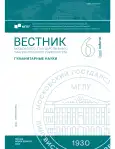Manifestation of the Economy Principle in the Italian Media Discourse
- Authors: Nazarenko A.I.1
-
Affiliations:
- Diplomatic Academy of the Ministry of Foreign Affairs of the Russian Federation
- Issue: No 6(887) (2024)
- Pages: 72-77
- Section: Linguistics
- URL: https://journal-vniispk.ru/2542-2197/article/view/303203
- ID: 303203
Cite item
Abstract
The article concerns the manifestation of the economy principle in the language of the Italian media, elaborates on the analytical tendencies in Italian, explores the analytical word forms such as “Noun+Noun”, “Verb+Noun” and “Adjective + Noun” compounds as well as the adaptation of the anglicisms. It posits that the abuse of this kind of neologisms in the media frequently leads to terminological confusion. In conclusion, we emphasize the importance of the economy principle for the development of the language.
About the authors
Anna Igorevna Nazarenko
Diplomatic Academy of the Ministry of Foreign Affairs of the Russian Federation
Author for correspondence.
Email: annushka_n@mail.ru
PhD in Philology, Associate Professor, Department of European Languages
Russian FederationReferences
- Kovrigina, A. I., (2013) Realizatsiia printsipa ekonomii iazykovykh sredstv v sovremennoi ispanskoi presse: leksiko sintaksicheskii aspect = The implementation of the principle of economy of language in the contemporary Spanish press: the lexical-syntactic aspect: abstract of the Doctoral Thesis in Philology. Moscow. (In Russ.)
- Haritonova, E. V., (2014) Dinamika struktury sintaksisa sovremennogo russkogo yazyka: tendentsii k ekonomichnosti i k distinktnosti (na materiale sovremennoj pressy) = The dynamics of the syntax structure of the modern Russian language: a tendency to profitability and distance (based on the material of the modern press): abstract of the Doctoral Thesis in Philology. Volgograd. (In Russ.)
- Velichko, A. V., (2015). Law of economy as a condition of language functioning and development. Mir russkogo slova, 2, 12–17. (In Russ.)
- Samboruk, L. A., (2020). Yazykovaya ehkonomiya v sovremennom angloyazychnom internet-prostranstve (na materiale publikacij o predvybornoj kampanii v SSHA) = Law of language economy in modern Emglish virtual space (based on American presidential campaign publications) . Modern Studies of Social Issues, 12(5), 305– 319. (In Russ.)
- Petrova, T. A., (2003). Svernutyye konstruktsii kak tip slozhnykh nominativnykh yedinits v sovremennom angliyskom jazyke = Compound structures as a type of complex nominative units in modern English: abstract of the Doctoral Thesis in Philology. Irkutsk. (In Russ.)
- Shhyogoleva, A. A., (2002) Strukturno-semanticheskie osobennosti leksicheskih edinicz tipa N+N v anglijskom yazyke (na materiale slovarnyh opredelenij v obshhej i special’noj leksike) = Structural-semantic features of the lexical units “N+N” in the English (based on the vocabulary definitions in common and domain-specific lexicons): abstract of the Doctoral Thesis in Philology. Moscow. (In Russ.)
- Nazarenko, A. I, (2020a). Tendenciya k analitizmu v yazyke ital’yanskoj pressy = The tendency towards analytism in the language of the Italian media . New World. New language. New Thinking (pp. 745–753): Proceedings of the III Annual International Scientific and Practical Conference. (In Russ.)
- Koptelova, I. E., (2020). Hungarian or Hunglish? In Anglijskij yazyk na territorii Soedinennogo korolevstva Velikobritanii i Severnoj Irlandii i za ego predelami (pp. 126–142): collection of papers. Moscow: INION RAN. (In Russ.)
- Nazarenko, A. I., (2021). The Anglicisms and the Pseudo-anclicisms in the Italian language in 2020. New World. New language. New Thinking (pp. 776–786): Proceedings of the IV Annual International Scientific and Practical Conference. Moscow. (In Russ.)
- Nazarenko, A. I., (2020б). Neozhidannyj rezul’tat pandemii: izmenenie v dikhotomii Sever – Yug v medijnom diskurse Italii = The unexpected consequence of the pandemic: a change in the “North-South” dichotomy in the Italian media discourse. Philolgicheskiy aspect. Seriya: Istoriya, kultura i iskusstvo, 1(1), 17–28. (In Russ.)
Supplementary files










